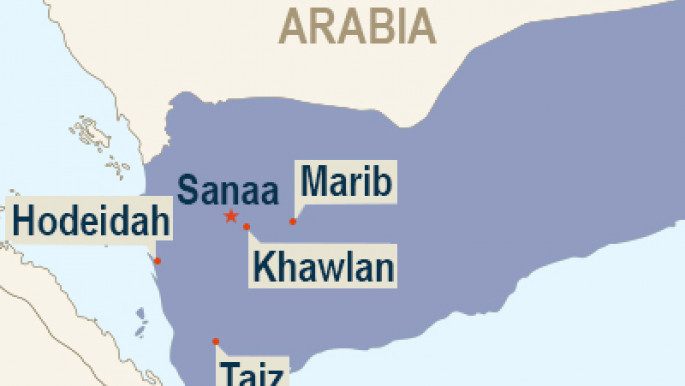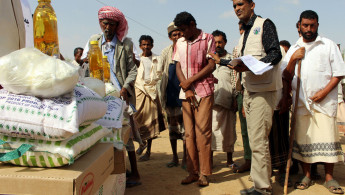Yemenis struggle to receive aid despite easing of Saudi blockade
Yemenis struggle to receive aid despite easing of Saudi blockade
Although Saudi Arabia has eased a blockade on war-torn Yemen, desperately needed aid is still not reaching those most in need as the country appears poised for further disasters.
4 min read
Yemen is running low on food and cooking oil [AFP]
While Saudi Arabia eased its crippling blockade on Yemen in December, essential aid such as commercial goods and fuel still struggles to reach those most in need.
Riyadh imposed a land, air and sea blockade on the country in November, allegedly to prevent the flow of weapons to Yemeni rebels, after Houthi forces fired missiles towards Saudi Arabia.
However, even aid convoys have been targeted by Saudi Arabia and the anti-rebel coalition. Humanitarian groups have urged the coalition to lift the blockade on Yemen due to the risk of mass starvation in the country, with Yemenis already impoverished after years of devastating warfare.
Easing the siege
Riyadh imposed a land, air and sea blockade on the country in November, allegedly to prevent the flow of weapons to Yemeni rebels, after Houthi forces fired missiles towards Saudi Arabia.
However, even aid convoys have been targeted by Saudi Arabia and the anti-rebel coalition. Humanitarian groups have urged the coalition to lift the blockade on Yemen due to the risk of mass starvation in the country, with Yemenis already impoverished after years of devastating warfare.
Easing the siege
Pressure from aid groups and condemnation from world leaders - including US President Donald Trump and French President Emmanuel Macron - pushed Saudi Arabia to partially lift the blockade on the key port of Hodeidah.
The Saudi-led coalition initially lifted the blockade for a period of 30 days since December 20, which has now been extended.
Yet the coalition is still blocking aid supplies from entering the country, despite announcing it would commit to the removal of entry restrictions on goods, humanitarian NGOs warn.
"Supplies of food and other life-saving supplies [entering Yemen] are still critically low. Container ships are still barred from entry, restricting imports of food, fuel and medicine," Richard Stanforth, Oxfam's humanitarian policy advisor, told The New Arab.
"Even the supplies that do reach dry land may not reach civilians because of check points, damage to roads, ongoing fighting and a fuel shortage."
Stanforth also warned that while the country's currency has collapsed, and shortages persist, people cannot afford to buy everyday goods like grain and cooking oil.
"These shortages mean that prices will continue to rise and peoples' ability to survive will be stretched even further. With 8.4 million people living on the brink of famine, any further restrictions on imports will mean more deaths."
Import reliant
Yemen is dependent on imports, with 90 percent of its food arriving externally, while 22 million Yemenis depend on humanitarian support to survive. Yet only 18 percent of Yemen's fuel needs and just over half of its required food needs have been met since the easing of the blockade.
 |
Even the supplies that do reach dry land may not reach civilians because of check points, damage to roads, ongoing fighting and a fuel shortage. - Richard Stanforth, Oxfam's humanitarian policy advisor |
 |
"As a starting point, the blockade should be permanently lifted and there should also be an end to unnecessary restrictions on cargo ships coming into port," added Stanforth.
Saudi Arabia pledged $1.5 billion in aid to Yemen as part of the Yemen Comprehensive Humanitarian Operations plan, to help meet the UN's $3 billion humanitarian appeal for Yemen.
While this raised the hopes of some, observers still worry it will not fully alleviate Yemen's humanitarian crisis unless the blockade and the conflict end.
Suze Van Meegan, a Yemen-based aid worker from the Norwegian Refugee Council, told The New Arab from Yemen that this aid package alone will not meet the country's humanitarian needs, while several supply routes are still hindered.
"We do remain concerned that in ambitiously planning for humanitarian aid to reach people in the future, the more urgent need to reach people with aid immediately has been overlooked. Hodeidah port is currently Yemen's most critical piece of civilian infrastructure, but one that is consistently under threat of attack or interference, and still subject to a blockade on commercial imports," she added.
She also voiced concern that the easing of the blockade is not stable, and political changes in the war could affect its temporary openness.
"People in Yemen need an absolute guarantee from the Saudi-led coalition that Hodeidah will be kept open, that commercial shipments will be cleared quickly, and that the port will be protected from attack."
 |
Van Meegan called for fuel supplies to be protected, due to high shortages, with transport and hospital generators still affected by the shortfall.
"When imports are disrupted, the impact reaches everyone. Insufficient fuel supplies are a very big factor of Yemen's ongoing deterioration - playing with policy or further politicising critical imports will invariably translate to more deaths in Yemen."
Blocking aid
Saudi Arabia was accused multiple times last year of blocking supplies into Yemen, including fuel deliveries to UN humanitarian planes, along with food and medicines entering via sea.
Van Meegan equally urged all parties to "agree an immediate ceasefire, as there is no amount of money and effort that will conquer Yemen's humanitarian crisis without an end to the senseless violence".
Continued fighting prevents conflict-stricken areas in Yemen from receiving humanitarian aid, NGOs have warned in the past.
Richard Stanforth warned that starving out Yemen will prolong the conflict, however, by pushing desperate Yemenis to join militia groups to survive and earn a wage.
"In the longer-term, we could see more people being driven into armed groups the longer that the economy is left to waste away. People desperately need food, medicine and a working economy to pay their wages."



